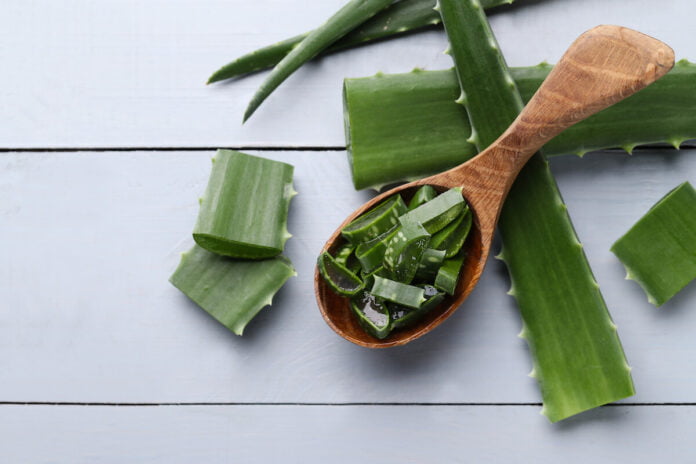For a couple of years it has become fashionable to use products with natural ingredients such as creams, gels, topical masks for the skin and hair. In addition to its innumerable benefits, due to its high content of vitamins, minerals and antioxidant substances; natural ingredients are cheap and easy to acquire.
For the production of pharmaceutical and cosmetic products, natural ingredients are used as excipients. That is, natural inputs such as Aloe vera, coconut or some oils are used as the raw material for the pharmaceutical and/or cosmetic product. Large industries, focused on offering a better product to their consumers, tend to add other vitamins, minerals, and antioxidant substances (Bonilla, et. al, 2016). In order to improve and accentuate the application results of their products.
The purpose of this article is to provide you with the necessary information so that you know the various benefits that Aloe vera has after its application on hair and skin. In addition, we offer you some tips so that you can use aloe vera in your day to day.
What is Aloe vera?
Aloe vera is a plant from the Asphodelaceae family with a long history of use in traditional medicine with multiple benefits both through oral consumption and topical use (on the skin).
The Aloe vera plant grows in arid and dry areas. This is characterized by its green and elongated leaves, hard on the outside and fleshy on the inside. Likewise, this plant has more than 350 variants, however, the most commercially used plants are Aloe barbadensis Miller (or Aloe vera L.), known as Barbados aloe, and Aloe ferox Miller, also called Cape aloe (Luengo , 2004).
The aloe leaves contain different parts that are commonly used for the manufacture of products. On the one hand, inside the leaf we can find a gel from the internal tissue. On the other hand, latex from the leaves can also be used. The benefits of Aloe vera are conferred due to its high content of vitamins, minerals, glycoproteins, amino acids, enzymes, acids, pyrones, sterols, derivatives of chromas and pyrones (Luengo, 2004). Among the studied benefits of Aloe vera are:
- Improvement of intestinal transit: The latex that makes up aloe vera has a high prevalence in the improvement and acceleration of intestinal transit (Sadoyu, et. al, 2021). In this sense, in case you suffer from concurrent constipation, adding aloe vera naturally or as a food supplement could improve the symptoms of constipation, since it has laxative properties.
- Improves the symptoms of irritable bowel syndrome: (Luengo, 2004; Sadoyu, et. al, 2021) mention that Aloe vera tends to act on the nerve endings of the colon, which is why it has an effect on intestinal motility. Likewise, its composition allows increasing the production of mucosa in the intestine and avoiding the absorption of water. Said factors are beneficial for the health of the individual who has irritable bowel syndrome.
- Reduces the symptoms at the stomach level caused by gastritis: Gastritis is a pathology known for its intense symptoms at the stomach level that translates as burning at the level of the upper sphincter, colloquially known as “the pit of the stomach”. Aloe vera has the ability to reduce heartburn in very severe cases of gastritis and completely cease the symptoms in mild cases (Luengo, 2004).
- Glycemic control: The Complementary and Integral Health Center (2016) ensures that the implementation of aloe vera in the daily diet could have positive effects on postprandial glycemia control. In simple words, aloe vera could control the level of glucose or blood sugar after each meal.
Benefits of aloe vera on hair and skin:
Since you know several positive effects that the consumption of aloe vera brings, we will tell you about some of its properties after being applied topically.
- Healing activity: The glycoproteins present in its composition allow it to act effectively on tissue regeneration processes and thereby accelerate the healing process of wounds or acne (Luengo, 2004; Sadoyu, et. al, 2021).
- Benefits on skin conditions: Rodríguez et al. generated a study on the benefits of Aloe vera on psoriasis, acne and dermatitis. In all conditions, the use of aloe vera accelerated the recovery process, scientific evidence ensures that this occurred due to its anti-inflammatory and healing properties. (Rodriguez, et. al, 2006)
- Useful for burns: Aloe vera has been used for many generations as a product focused on skin regeneration. This property has been conferred since it was found that aloe vera tends to improve cells damaged by UV rays and speed up their recovery process. Likewise, its topical application on a burn decreases the burning sensation (Center for Complementary and Integral Health, 2016).
- Aloe vera and hair health: The application of Aloe vera on the scalp improves hair hydration, revitalizes it, decreases sebum production and decreases the prevalence of developing dandruff (Lambert, 2021).
Recommendations for the use of aloe vera:
Aloe vera is a product that is easy to acquire, both in its natural form and as a food supplement or topical pharmaceutical form (gels, creams, ointments). However, this time we will focus on its natural form applied topically:
- Application on the scalp: To apply the aloe vera on the hair, we recommend that you make a cream or a homogeneous solution with the aloe vera. It is optional to add other products such as honey or coconut oil, however, it is worth mentioning that by adding more natural products we favor a better nutritional contribution for our scalp. Once you have achieved the homogeneous mixture, you must separate your hair into sections and apply the mixture. Do not forget to massage and let rest for 15 minutes, you can repeat this recipe as many times as you consider necessary.


